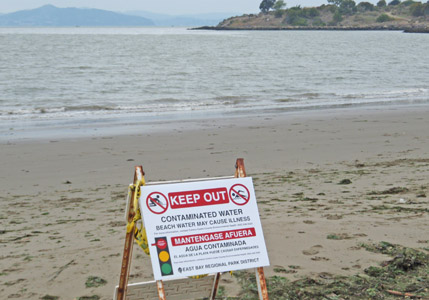I contacted several of the watersport companies that I work with every month to compile our Waterfront Adventures section, and I asked them how the recent oil spill affected their businesses.

Photo by Susan Schwartz of Friends of Five Creeks
By Joel Williams
Published: December, 2007
The responses ranged from, It didn’t affect us at all, to We were completely shut down. Some companies shut down voluntarily, while others that were not directly affected noticed that no one showed up, even though the nice weather would normally have meant brisk business. The most poignant response was from Anthony Sandberg, president of OCSC Sailing School in Berkeley Marina, who told me, This level of governmental preparation, it seems to me, is brought to you by the people who gave us Katrina.
According to Sandberg, on the morning of November 7th, they first heard reports of only a small 140-gallon spill. As the day progressed, they were dismayed as they heard accounts of increasing damage. Meanwhile, the tide and currents spread the uncontained spill throughout the Bay and out the Gate as the impact broadened. By the second day, the wind and tide had brought the oil to the eastern shore and right into Berkeley Marina. I was bewildered why there weren’t supplies available, said Sandberg. How much easier it would have been to close off the narrow entrance to our marina with a boom. The Berkeley Marina was eventually boomed off, but not before it was already full of oil. We’re supposed to be ready for things like this, he said. They were then notified that the contaminated marina was closed; it remained that way for a full week.
The general attitude I felt from the people I talked to—after disgust, that is—was that we had somehow dodged a bullet.
Don’t get me wrong, I think what happened was a serious tragedy made multiple times worse by the inept Coast Guard response. But what if a large oil tanker had collided with a bridge or run aground in the fog that fateful morning? The Exxon Valdez spilled almost 11 million gallons of oil in the remote Prince William Sound 17 years ago, and some say it will take more than 30 years for those pristine shoreline habitats to recover. And that is not even close to the largest spill recorded. Historic records show that there have been over 65 spills of more than 10 million gallons worldwide.
If these results are an example of our preparedness—or, more accurately, lack of preparedness—with a relatively small 58,000-gallon spill, just imagine what our beautiful Bay would look like if a mega tanker or, God forbid, a planned attack released millions of gallons of oil or some other contaminant into our waters. State Representative Tom Lantos of San Mateo said during a news conference, This is incomprehensible in a climate where we ought to be prepared for terrorist attacks and acts of nature which we can not predict, where we have to react instantaneously. Here was what appears like an ordinary, hum drum, routine ship movement resulting in this catastrophe. I couldn’t agree more.
The Coast Guard insists that its response to the oil spill was appropriate and by the book. They claim that they followed the procedures as outlined in the National Oil Spill Response Standards. They would not, however, comment on whether those standards may need some revisions. I am certainly no expert, but it seems that if the Coast Guard had immediately put booms around the Cosco Busan and then assessed the damage, the results would have been dramatically different. But maybe that’s not in the book.
Why weren’t we prepared? Why were offers of assistance from trained hazardous materials teams from other cities, and offers of boats from local fishermen to assist in skimming oil refused or ignored? Why aren’t there multiple stations and warehouses with all of the necessary equipment throughout the Bay with trained personnel that can react on a moment’s notice to such a disaster? Why aren’t there people who are trained to boom off all the marinas and protect the wetlands of the Bay in a timely manner?
There are almost as many committees investigating this disaster and the poor response as there are questions that still need to be answered. There is also a brand new government agency, the Bay Area Water Emergency Transportation Authority (WETA), which is about to emerge in 2008. Their main mission is to plan and build an emergency response and disaster recovery water transportation system for the region that will be capable of responding to an earthquake or other disaster. Helping to prepare the Bay Area to react responsibly to another disaster like this should be high on their to-do list.

